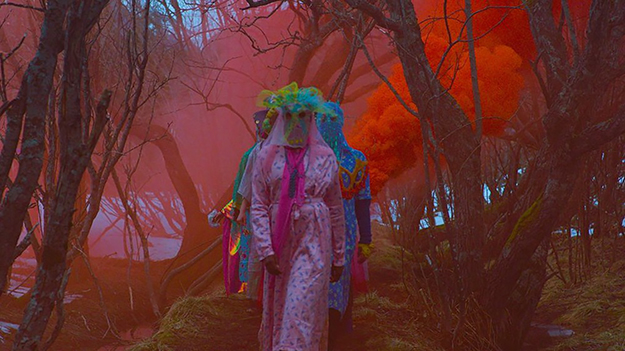In the Clouds: Locarno 2022
This article appeared in the August 18, 2022 edition of The Film Comment Letter, our free weekly newsletter featuring original film criticism and writing. Sign up for the Letter here.

Sister, What Grows Where Land Is Sick? (Franciska Eliassen, 2022)
When the program for 75th Locarno Film Festival was announced, most reports noted the promising number of high-profile and veteran names in the lineup, including Aleksandr Sokurov, Nikolaus Geyrhalter, Abbas Fahdel, Patricia Mazuy, and João Pedro Rodrigues. Compared to a 2021 edition comprising mostly unknowns, this roll call inspired a sigh of relief among critics and cinephiles still coming to terms with the festival’s new leadership under Giona A. Nazzaro. And yet, though most of these heavyweight auteurs turned in commendable work, the festival was once again defined in terms of overall quality by less established talents. Indeed, if something can be said to characterize Nazzaro’s two editions as director, it has to do with neither genre cinema nor commerciality (both of which he promised to inject into the festival), but rather the air of intrigue and possibility that surrounds most screenings, and which often enough rewards the leap of faith it takes as a viewer to go into a film with little or no context.
Among the more recognizable up-and-comers, Italy’s Alessandro Comodin returned to Locarno for the first time since the premiere of his 2011 feature debut Summer of Giacomo, which won the top prize in the Filmmakers of the Present section, devoted to first and second features. His latest, The Adventures of Gigi the Law, is a small-scale pandemic production that nonetheless received a well-deserved call-up to the International Competition, where it won the Special Jury Prize. Gigi stars Comodin’s uncle Pier Luigi Mecchia (a real-life cop) in the title role of a guileless police officer in San Michele al Tagliamento, a rural town in northeast Italy. Ostensibly investigating a suicide (or is it a murder?), Gigi spends his days not so much on the beat as in the clouds, driving around and telling mundane stories to his partner, or else exchanging flirtatious radio banter with the new female hire at the dispatch office. Meanwhile, at home, he’s in a feud with his neighbor over the absurdly overgrown garden that Gigi refuses to properly maintain. The film excels in the subtle humor of its dialogue (spoken in the hyper-regional Friulian dialect) and performance styles, which, with roots in the reality of this very specific milieu, dovetail to surprisingly moving effect in its closing moments. Seated on a park bench beside his partner, Gigi finally opens up with memories of an old acquaintance whom he once helped admit to a psychiatric clinic, revealing what might be a kind of self-therapeutic dimension to the character’s perennially upbeat demeanor.
In this year’s Filmmakers of the Present section, two debuts took daring and idiosyncratic approaches to subject matter that could easily have produced pro forma results. In Sister, What Grows Where Land Is Sick?, Norwegian director Franciska Eliassen tackles issues related to mental and ecological health in intimate, empathetic fashion with a story about two siblings coming to terms with the elder’s undiagnosed illness. Framed around passages that the younger Eira (Keira LaHart) reads from her sister Vera’s (Ruby Dagnall) diary, the film—apparently shot by a 23-year-old Eliassen in just seven days—unfolds in an oneiric manner befitting Vera’s increasingly slippery relationship with her Nordic surroundings and her role in their ongoing devastation. (While unwieldy, the English title perfectly encapsulates the tone and syntax of Vera’s diaristic musings.) Eliassen gracefully pairs instances of tenderness and occasional discomfort (a playful sexual encounter between Vera and two boys, for example, eventually exposes the character’s inability to fully grasp the implications of certain social situations) with extravagantly staged and colorfully designed dream sequences that give life to Vera’s innermost feelings and fantasies. In these moments, the film bursts forth with a stirring sense of awe in the face of a world that too often disregards the beauty and imagination of its less normative inhabitants.
French filmmaker David Depesseville’s Astrakan centers on Samuel (Mirko Giannini), a 12-year-old orphan whose foster parents, Marie (Jehnny Beth, lead singer of the British post-punk band Savages) and Clément (Bastien Bouillon), have taken him in less out of affection than a need for the money the arrangement will generate. Set in a small town in Catholic rural France, the film knowingly echoes Maurice Pialat’s own first feature, L’enfance nue (1968), in its tale of wayward adolescence and the complications of adoption, as well as in its bracingly direct visual style. Unlike Pialat, however, Depesseville doesn’t concern himself with the bureaucratic or social aspects of the foster-care system so much as with the impressionistic effects the situation has on his young protagonist’s psyche, and the challenge of representing those often contradictory feelings cinematographically. Astrakan is replete with narrative ellipses and disorienting character beats (most involving Marie’s brother Luc, who takes a keen interest in Samuel) that lend the film an air of transgression and violence. This places it perhaps closest to the early films of Bruno Dumont—a suggestion borne out in a wildly operatic coda that initially seems superfluous but may in fact hold the key to the film’s themes of lost youth and repressed trauma. Love it or hate it, it’s a last-minute bid for transcendence that most filmmakers dare not attempt.
Jordan Cronk is a film critic and founder of the Acropolis Cinema screening series in Los Angeles. His writing has appeared in Artforum, Cinema Scope, frieze, the Los Angeles Review of Books, Sight & Sound, and more. He is a member of the Los Angeles Film Critics Association.







